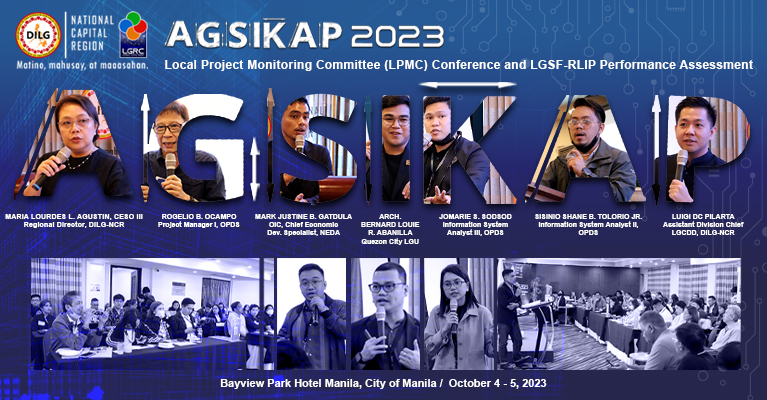
The Department of the Interior and Local Government – National Capital Region (DILG-NCR), through the Local Government Capability Development Division – Project Development and Management Unit (LGCDD-PDMU), conducted this yearâs AGSIKAP, or the Apprising Government Employeesâ Skills on Infrastructure Projects, Knowledge on Monitoring and Evaluation, and Performance on October 4-5, 2023 at Bayview Park Hotel in the City of Manila.
AGSIKAP serves as a platform for the Local Project Monitoring Committee (LPMC) Conference and Local Government Support Fund – Results-based Monitoring and Evaluation of LGUsâ Infrastructure Projects (LGSF-RLIP) Performance Assessment. The two-day activity is designed to equip participants with basic technical knowledge they need to improve their performance in the monitoring and evaluation of development projects initiated by their respective LGUs.
Present on the first day were DILG-NCR City Directors, representatives of the different LGU Planning Offices, and members of civil society organizations. The second day was attended by the focal persons of the DILG Field Offices, City and Municipal Engineers, and SubayBAYAN Encoders.
In her welcoming remarks, DILG-NCR Regional Director Maria Lourdes L. Agustin, CESO III underscored the importance of commitment to actualize the mandate of public officials to ensure the efficient devolution of the delivery of basic services and operation of facilities at the local level.
âThe power given to us entails not just great responsibility, but also a commitment to ensure the effective utilization of public funds and resources, increase citizen participation in local governance, and uphold the highest standards of transparency and accountability,â RD Agustin explained.
For the first session, DILG Office of Project Development Services (OPDS) Project Manager Rogelio B. Ocampo reviewed the stages of the project development cycle, including basic concepts related to monitoring and evaluation. He then discussed the legal bases for the creation of the LPMC, as well as its compositions, roles, and responsibilities.
After the OPDS presentation, National Economic Development Authority (NEDA) OIC and Chief Economic Development Specialist Mark Justine B. Gatdula provided an overview of the Regional Project Monitoring and Evaluation System (RPMES).
As a way forward, the following action plan was presented: i) Coordination between the National Project Monitoring Committee (NPMC) Secretariat and DILG-OPDS in formulating and promulgating a possible Joint Memorandum Circular to reinforce adoption of the Revised RPMES Operational Guidelines; ii) Possible updating of the LPMC Handbook; and iii) Coordination between the NPMC Secretariat and the Metropolitan Manila Development Authority (MMDA) (acting in its capacity as the Metro Manila Council/Regional Development Council-NCR Secretariat) regarding the institutional arrangements for a possible creation of a Regional Project Monitoring Committee under the Metro Manila Council.
Finally, Architect Bernard Louie R. Abanilla of the Quezon City government shared best practices in relation to the LPMC, where he introduced the system features of the monitoring tool being utilized by the LGU for their development projects.
On the second day of AGSIKAP, LGCDD Assistant Division Chief Luigi D.C. Pilarta opened the session by thanking the participants present, who came from different LGUs, while providing an overview of the day’s agenda.
PDMU Engineer III May C. Morillo presented the accomplishments of each NCR LGU regarding their FY 2022 projects funded by the LGSF – Financial Assistance to LGU (FALGU). Of the 270 projects covered by the report, 94.07% were projects undertaken by barangays, with only 5.93% of the projects attributed to city-level.
Following the foregoing presentation, PDMU Engineer III Glenn B. Murillo proceeded with his discussion on the FY 2023 LGSF-approved projects, identifying the LGUs responsible for implementing the same. He also delved into the requisite documents and the detailed project information required for encoding into the SubayBAYAN Portal.
Then, PDMU Head Dennis R. de Paz shared the salient features of the Revised Omnibus Guidelines (DILG MC No. 2023-063) for Monitoring and Evaluating Projects under the Assistance to Local Government Units â LGSF. He explained the innovative process enabling LGUs to request or submit project proposals to the Department of Budget and Management (DBM) using the Digital Request Submission for Local Government Support Fund (DRSL).
DILG-OPDS ISA III Jomarie S. Sodsod also provided a comprehensive breakdown of the features and functionalities of the Rapid Sub-project Sustainability Assessment (RSSA) System. During his presentation, he explained the different roles of users in the system and carefully detailed the important criteria that determine how a project is automatically added to the system.
Towards the end, DILG-OPDS ISA II Sisinio Shane B. Telorio Jr. discussed the latest enhancements to the SubayBAYAN Portal, where he showcased the newly integrated features within the system. To further enhance user understanding, a hands-on simulation was conducted for both systems, allowing participants to become familiar with the features, user interfaces, and functionalities.
In closing, LGCDD Assistant Division Chief Luigi D.C. Pilarta emphasized the need to strengthen the capacity of LGU Officials in terms of monitoring and evaluating projectsânot for mere compliance, but to fulfill their mandate of delivering essential services to the public effectively. ###
